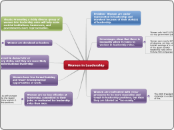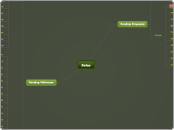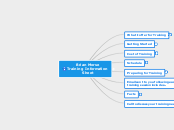Behrends, Matthias (2019): The [https://ecs.emotioncoaching.net Emotion Coaching System] - Reflections on Transparency and Clarity Through [https://demonstrations.emotioncoaching.net Demonstrations]
Keywords
Transparency & ECS
Locations
Unit of Demonstration Course
Full Video
Quotations & Comments
[Summary] Acknowleging a new or different approach often requires to look at own practices critically.
"My hopes are that we cannot only allow people to make the (...) process of the emotional growth, necessary to be able to experience yourself and learn who you really are. But at the same time, and this is a condition and a consequence of the former, to create lives where people do not need so many defenses."
Vision
New Video
"Experience yourself and learn who you really are."
landing page?
Value proposition
"Shallowness is modern."
"Shallowness is modern. It is a characteristic of modern times to live in the shallow
"People who go through pain discover their human nature in a usually more profound way than people who don't experience pain. Because they don't have to."
"The fact that [the methods] work is due to the fact that they work on the basis of how human nature is.
Human Nature
"In the end all the methods we're using come from the clients. Yes, they might have been put into a structured form by empathetic practitioners ..."
About the Methods
"I think us being afraid showing what we're doing is a feeling that I also had and I believe I overcame it. And the demonstrations are the proof of that. That I say 'Here it is', now it's on the table nad now at least we have something to talk about, maybe to learn about."
"The basis is simple, the principles are simple, but yes, there are then many details. And you've got to learn how to connect the details and what happens to the actual rules and guardrails that I'm putting out."
Guardrails
Training Process
"Creating the session with your client - you have to create with them. Educate them about the intentions and how things work
Creativity when doing sessions
Psychoeducation
"Your clients will tell you [feedback] but they cannot tell you everything, either. I think the combination is great. Having the feedback from the clients, you see the reaction and you know what they need.
Feedback
"And yes, performance anxiety is real and insecurities are healthy."
"Another mentee of mine (...) said: You know I'm usually afraid of, I'm insecure, I have my doubts. And I'm like: That's great! It's the responsible people, I would say the good people in that profession who have doubts and who try and look at what they do critically."
"But still most of the things I do there [in the demonstrations] I feel very warm about them. It moves me, it's ... being able to relive these experiences. (...) to have the inner observer active that also for me doesn't always work 100%, so kind of gives me an observer perspective on my own performing."
reflections on my own performances
Inner Observer
"For sure even I would do certain things now different when I see them in the demonstrations."
My own process
Demonstrations / Reflections
"... maybe also out of the fear it might demystify what they do.
"The majority of people will need some proper guidance in order to learn it, because it is in the end then very complex.
"There might be very capable people out there who might copy it (...) I give them that. If you can from what I show take what you need then please go ahead and do."
"And I'm thinking about that myself sometimes: Now I am sharing all these demonstrations with people. Does it make it look too easy? ..."
"Yes, if you put out there what you do, like either you tell or you show - in a video like I sometimes do - yes you make yourself vulnerable. Because there it is. Like a performer on stage musician, singer There it is. You can explain a lot, but there it is. - ... That might be one reason why people usually avoid just saying I do A, B, C ..."
Demonstrations / Reactions
Vulnerability
"There is also the tendency - and this is what ####
"Of course the questions are legitimate. (...) And they need to be addressed and if possible scientifically. There is just no way around [this]. Just some guy saying something and then we all sign up to it (...) That would be creating a cult and that's not my intention."
no cult
Scientific approach
About ECS
...
intimidated
"It also might be disappointing for yourself. You might have put many years or a lot of time, a lot of money in signing up to certain kinds of idea which do not really give you that [#]."
"If you say something that you see the way it's being done and you say that is excellent the way it's done you have to look then at your own things and you're like well, then maybe I got to change something. And that may cause a lot of insecurities."
"You cannot expect people so easily to say what you show is great, because usually that implies that a person recognizes that what they are doing is not as good."
The Need to Unlearn
ECS Demonstrations
"What I would like to see more is that people respond to [the demonstrations] and say like: 'That was impressive how the methods work.' (...) It is not about me. I understand myself as a messenger or a performer so that I can show what is possible."
"... this is what usually is missing in the chain is: What are you actually doing. What is your procedure. What is it that you do, what is is that you say.
And I con't care so much about the 'why'."
[Summary] There is not much transparency when it comes to interventions. There is a lot of talk on the conceptual level. A large part of the communication is about the effects of methods.
Transparency / lack of
Demonstrations
Excerpt
Tasks
excerpt
Reference
Author
![Behrends, Matthias (2019): The [https://ecs.emotioncoaching.net Emotion Coaching System] - Reflections on Transparency and Clarity Through [https://demonstrations.emotioncoaching.net Demonstrations] Behrends, Matthias (2019): The [https://ecs.emotioncoaching.net Emotion Coaching System] - Reflections on Transparency and Clarity Through [https://demonstrations.emotioncoaching.net Demonstrations]](/image/e320ed460c97ee4fb6dd81024d55906c/behrends-matthias-2019-the-httpsecsemotioncoachingnet-emotion-coaching-system-reflections-on-transparency-and-clarity-through-httpsdemonstrationsemotioncoachingnet-demonstrations.png)








